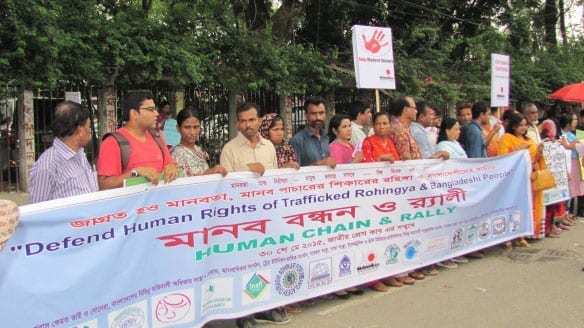
Jan 24, 2020
Imagine the population of New York City. Then triple that number. That’s how many people around the world are being robbed of their freedom through human trafficking—24.9 million.
While “trafficking” seems to imply movement across borders, some 77 percent of those targeted by human traffickers do not leave their country of residence, according to the International Labor Organization (ILO). Most are trafficked for forced labor, one-third are children.
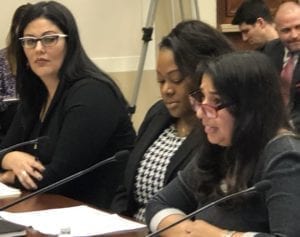
Solidarity Center’s Neha Misra testified on Capital Hill on the need for worker rights in forming unions and bargaining as key to ending human trafficking. Credit: Solidarity Center/Tula Connell
“Human trafficking thrives in a context of private actors and economic coercion,” says Neha Misra, testifying recently on Capitol Hill before the Tom Lantos Human Rights Commission in a House Foreign Relations Committee hearing.
“We must address what one leading global expert on the international law of human trafficking calls the ‘underlying structures that perpetuate and reward exploitation, including a global economy that relies heavily on exploitation of poor people’s labor to maintain growth and a global migration system that entrenches vulnerability and contributes directly to trafficking,’ ” says Misra, Solidarity Center senior specialist for migration and human trafficking. Trafficking and severe labor exploitation are part of a continuum of labor exploitation and abusive working conditions workers face around the world in workplaces as diverse as factories, farms and offices.
The Lantos hearing was part of a series of congressional events in January around U.S. Human Trafficking Awareness Month, which marks the date Congress passed the Trafficking Victims Protection Act (TVPA) in 2000. That same year, the United Nations passed the Protocol to Prevent, Suppress and Punish Trafficking in Persons, Especially Women and Children (the Palermo Protocol). As part of the TVPA, the U.S. State Department each year issues a detailed report on trafficking in persons, ranking countries on the extent to which they are addressing and eliminating it.
Since then, global nations have a clearer understanding of human trafficking—including its direct connection to forced labor and exploitation—and 168 governments have implemented domestic legislation criminalizing all forms of human trafficking, transnationally and nationally.
Yet as indicated by the staggering number of those trafficked, much more needs to be done.
“Over the past 20 years, the extent of forced labor in global supply chains has become increasingly clear. And yet, governments continue to fail to hold corporations to account,” says Misra.
Migrant Workers, Domestic Workers Targets of Trafficking
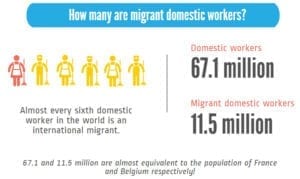 Isolated in private homes, domestic workers, whether nationals or migrants, are particularly at risk of exploitation, harassment and abuse, including sexual violence—and have difficulty accessing justice. Domestic workers, who comprise 11.5 million migrant workers—are also among the largest group of trafficked migrant workers and are vulnerable to human trafficking and forced labor—within their home countries, as internal migrants, and as cross-border migrants.
Isolated in private homes, domestic workers, whether nationals or migrants, are particularly at risk of exploitation, harassment and abuse, including sexual violence—and have difficulty accessing justice. Domestic workers, who comprise 11.5 million migrant workers—are also among the largest group of trafficked migrant workers and are vulnerable to human trafficking and forced labor—within their home countries, as internal migrants, and as cross-border migrants.
“Recognizing domestic workers as workers is key to combatting the vulnerability they face to human trafficking,” says Alexis De Simone, Solidarity Center senior program officer for the Americas. De Simone spoke at a Capitol Hill briefing Friday sponsored by U.S. Rep. Pramila Jayapal.
A domestic worker who requested anonymity described at the briefing the abusive conditions she experienced after a diplomat brought her from Chile to the United States in 2009. She was promised fair wages and benefits, but after she started working, the family refused to pay her. Her employers withheld food, stole her passport, and threatened her with deportation if she talked with anyone outside the household—an all-too common experience for domestic workers worldwide.
Collective Action Key to Ending Trafficking, Forced Labor
Combating human trafficking, forced labor and other forms of severe labor exploitation means putting worker rights at the forefront of solutions.
The 2011 ILO convention (global treaty) covering domestic workers “has raised the bar globally for states and employers to recognize and enforce the labor rights of domestic workers,” says De Simone.
Domestic workers around the world educated and mobilized for passage of the ILO Convention on Domestic Workers, along the way helping workers understand that violence, abuse, coercion and intimidation are not part of the job. “And that recognition, that righteous indignation, is often the spark for organizing that helps us end the imbalance of power,” says De Simone.
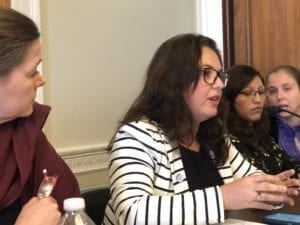
“Recognizing domestic workers as workers is key to combatting the vulnerability they face to human trafficking”—Alexis De Simone, Solidarity Center. Credit: Solidarity Center/Tula Connell
Yet not only international law, but on-the-ground grassroots union organizing and building power among domestic workers is key to combating vulnerability to trafficking, she says. “Union contracts are helping domestic workers worldwide ensure their rights to safe jobs without forced labor and human trafficking.”
De Simone cited examples of how union collective bargaining agreements have improved conditions for domestic workers in Argentina, Uruguay and Sao Paulo, Brazil, and shared the success of domestic workers in Mexico who ensured the country’s new labor law includes domestic workers—often among an excluded group of workers in many country’s labor laws.
Unions also are reaching across borders, building union-to-union relationships between countries of origin and destination like Paraguay and Argentina, Nicaragua and Costa Rica, Nepal and Lebanon.
But “freedom of association must be assured in practice, not just law,” says Misra. “This means strict penalties for employers who fire, retaliate against or collude with government officials to deport migrant workers seeking to form unions.”
Says Misra: “From rubber plantations in Liberia, garment factories in Jordan and to domestic workers’ households in Kenya, Solidarity Center has seen time and again how democratic worker organizing and collective bargaining can eliminate forced labor in a workplace.”
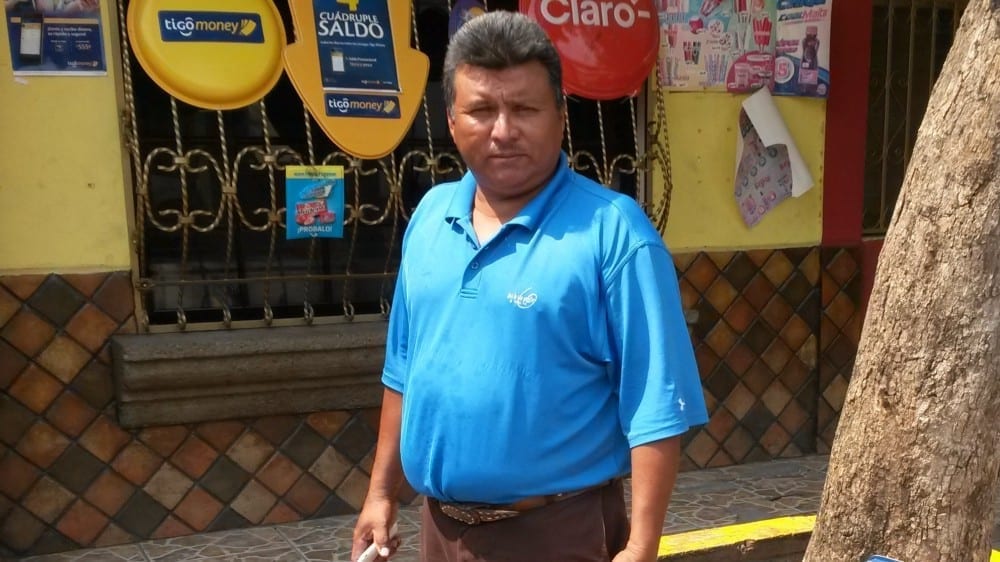
Jan 17, 2020
The International Trade Union Confederation (ITUC) and the Network Against Anti-Union Violence in Honduras are urging the government to drop all charges against Moisés Sánchez, safeguard his protection as a human rights defender under threat, and ensure he can freely exercise his union activities without violence or reprisal.
Sánchez, secretary general of the melon export branch of the Honduran agricultural workers’ union, Sindicato de Trabajadores de la Agroindustria y Similares (STAS), is on trial January 22 for criminal charges without the right to appeal. He is charged with four counts related to “usurpation” for his community’s construction of an access road and faces a possible 30-year prison sentence.
In the southern community of La Permuta, 450 community members voted in 2018 to build a road allowing residents regular access to nearby towns after government officials documented that the land was publicly owned. Previously, La Permuta residents were unable to cross rivers during heavy rains to Choluteca, where many work in the melon fields.
More than a year after the road was built, a land owner claimed the land as her property and pressed criminal charges. Five elected community leaders have been charged. Sánchez is the only grassroots community member not part of the elected leadership who was charged for the road construction. The Network believes Sánchez is being targeted for his role in seeking decent wages and working conditions for agricultural workers, moves often violently opposed by their multinational employers. The Network fears he would face violence and possible death if imprisoned.
In 2017, Sánchez and his brother, union member Misael Sánchez, were attacked by six men wielding machetes as they left the union office in Choluteca. The company later fired him in what union leaders say is retaliation for his efforts to improve working conditions through a union. Sánchez is among those listed by the International Labor Organization (ILO) as requiring protection from the Honduran government, and as a documented victim of anti-union violence, the Network says that the state has an obligation to protect human rights defenders and should not permit these attacks on their lives and liberty.
Violence Against Union Leaders Frequent Yet Unpunished
The Network’s most recent report on union violence, released in August, finds agricultural worker activists represented three quarters of the victims of anti-union violence in Honduras between February 2018 and February 2019. Yet according to the Network, no arrests were made in 60 cases of anti-union violence in the past three years.
Melon workers on plantations across the Choluteca region have long endured worker rights abuses. After they sought to improve their working conditions by forming unions in 2016 with STAS, a FESTAGRO affiliate, employers intimidated and illegally fired many workers, despite Honduran law and international conventions making it illegal to retaliate against workers for organizing unions to protect their rights on the job.
The ILO held back-to-back hearings at the International Labor Conferences (ILC) in 2018 and 2019 on Honduras’s failure to abide by its international commitments. The ILC report in 2018, which expressed “deep concern at the large number of anti-union crimes, including many murders and death threats, committed since 2010,” urged the Honduran government to protect vulnerable unionists, investigate more than a decade of unsolved murders of union leaders and prosecute those responsible for the crimes.
In 2012, the AFL-CIO and 26 Honduran unions and civil society organizations filed a complaint under the labor chapter of Central American Free Trade Agreement (CAFTA). The complaint, filed with the U.S. Department of Labor’s Office of Trade and Labor Affairs, alleges the Honduran government failed to enforce worker rights under its labor laws. In an October 2018 report, the U.S. Trade and Labor Affairs office said Honduras had made no progress on any of the emblematic cases since 2012.
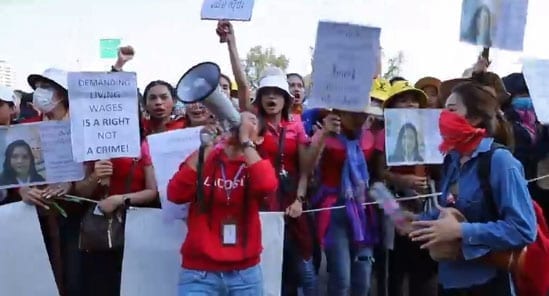
Jan 14, 2020
Thousands of casino workers at NagaWorld hotel and casino complex in Phnom Penh, Cambodia, won a wage increase that boosts pay between 18 percent and 30 percent and secured the reinstatement of union president Sithar Chhim, who was suspended from her job in September for defending the right of a union member to wear a shirt with a message that called for higher wages. The agreement also provides a $200 incentive for workers without health insurance and a bonus equal to roughly two months’ salary, says Chhim.
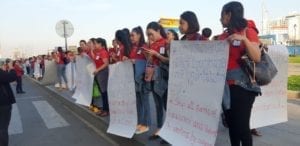
Credit: Solidarity Center
Some 5,000 of the 8,000 workers—including dealers, slot machine workers, housekeepers and technicians—struck the casino January 9, and more than 4,000 rallied outside the complex for two days with signs saying “Demanding living wages is a right, not a crime!” and holding placards with photos of Chhim seeking her reinstatement. Chhim, a game floor supervisor, is branch president for the Khmer Employees’ Labor Rights Support Union of NagaWorld.
NagaCorp, a five-hotel resort and casino, has an exclusive, multidecade license to operate in Phnom Penh and reported an estimated $1.8 billion in revenue last year, up from $1.5 billion in 2018. Yet housekeepers are paid $191 per month.

Police at NagaWorld hotel and casino as workers rallied outside. Credit: Solidarity Center
In May, nearly all 4,000 union members signed a petition demanding a wage increase, and the union began negotiations with the employer in June. When the company did not return to the bargaining table after three months as it indicated it would, more than 1,500 union members met September 19 and agreed to wear T-shirts with a message highlighting the company’s profits and expressing workers’ need for a wage that pays their rent, food, transportation and other basic monthly expenses.
The next day, Chhim was detained for hours at the facility and suspended. Union members immediately walked out in support of her. Sithar told Equal Times she then urged her colleagues to continue to work as usual, while organizing subtle protest actions, which included union members wearing pink face masks, black armbands and other markers of solidarity as they enter and exit the tightly guarded checkpoints of the complex.
After the union provided legal notice of the strike, the company continued hiring new workers, providing them accommodation and food in the company’s building and prohibiting them from leaving the facilities or contacting their families, according to the union.
Challenging Environment for Workers
The casino workers’ victory is all the more notable because of the many recent challenges to worker wrights in Cambodia.
Union leaders say amendments to 10 articles in Cambodia’s Law on Trade Unions restrict fundamental union activities. For instance, one amendment deprives unions of their right to hold legal strikes. “[Holding] a legal strike is always difficult, and I think the barriers in the Trade Union Law have actually made it more difficult,” says William Conklin, Solidarity Center Cambodia country director.
Cambodia’s labor rights are currently under intense scrutiny, as the European Union decides whether to rescind the nation’s preferential trade status that grants Cambodian exports duty-free access into EU markets.
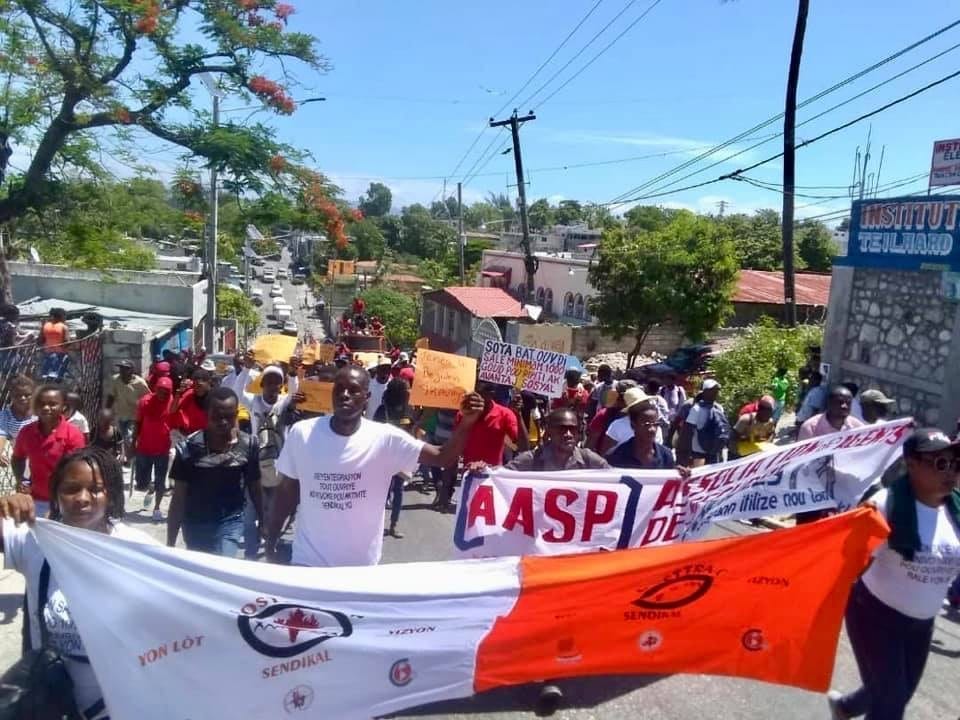
Jan 9, 2020
Ten years after a magnitude 7 earthquake destroyed a large swath of Haiti, killing more than 300,000 people and injuring another 1.5 million, workers and their families have not benefited from the billions in international aid that poured into country after the disaster. Nor has the government’s response—expanding low-wage, garment-sector jobs—alleviated poverty. Instead, they struggle to support their families with wages too low to live on even as escalating prices for fuel and other necessities compound the difficulties in their daily effort to survive.
“Workers live day by day,” says Reginald Lafontant, secretary general of the Groupement Syndicat des Travailleurs Textil pour la Reimportacion d’assemblage (GOSTTRA), a garment worker union and Solidarity Center partner.
In response to ongoing mass protests last fall against fuel and food shortages and government corruption, President Jovenel Moïse increased the minimum wage for garment workers and others in the export manufacturing sector from 420 gourdes a day to 500 gourdes ($5.09) a day. The miniscule increase left workers’ wages at less than 2018 levels because of inflation, and the move infuriated workers, who told Solidarity Center staff that the new wage is not enough to pay for food, transportation, housing, children’s school fees and medical care.
Workers Need $18.30 a Day to Support Themselves
More than 60 percent of Haitians survive on less $2 a day, and more than 2.5 million people fall below the extreme poverty line of $1.23 per day. The Solidarity Center report, “The High Cost of Low Wages in Haiti,” which tracked living expenses for garment workers from September 2018 through March 2019, recommends the government increase the minimum wage to an estimated $18.30 per day and allow workers to select their own representatives to the country’s tripartite minimum wage committee.
The cost of living in Haiti has increased by 74 percent since the Solidarity Center’s first wage assessment in 2014. Based on the current minimum wage, workers must spend more than half (55 percent) of their take-home pay on work-related transportation and a modest lunch, leaving little else to cover other necessities. Some workers say they can only afford to eat once per day.
The country’s inability to provide basic goods and services affects workers’ job security as well. With no propane available for cooking in the city, businesses last fall put their staff on unpaid leave. Hotels are closing and major airlines have cancelled flights to the country because of the economic and political turmoil, increasing unemployment and choking off income from much-needed tourist dollars. Haitians are outraged that the island has received millions of dollars in aid since the 2010 earthquake, but public services and infrastructure are nearly nonfunctional.
Haiti’s economy, which never recovered after the earthquake and the subsequent cholera outbreak that claimed some 10,000 lives, has worsened over the past three years. The Haiti Advocacy Working Group, which includes the Solidarity Center, is calling for policies that focus on an equitable and livable future and “promote the creation of decent employment that enables Haitian workers to adequately care for themselves and their families.”
Unions are in the forefront of calling for action to address the crisis. More than 40 labor organizations joined a call last fall for vast nationwide legal reforms, including free and fair elections and the resignation of Moïse. More recently, three Solidarity Center partner unions in the garment industry—GOSTTRA, Batay Ouvriye and Centrale Nationale des Ouvriers Haitiens (CNOHA)—rallied to call for better working conditions, the proper management of pension and social security funds, a living wage and government accountability for corruption.
The government failed to hold elections in October, and one-third of the Senate, the entire Chamber of Deputies and all local offices are set to expire in January 2020, setting the stage for a potential constitutional crisis and another round of widespread protests.

Dec 21, 2019
Washington, DC — The National Endowment for Democracy (NED) and its four core grantees, the National Democratic Institute (NDI), the International Republican Institute (IRI), the Solidarity Center, and the Center for International Private Enterprise (CIPE) are deeply gratified that the U.S. Congress has shown strong bipartisan support for our work with a substantial increase in NED’s annual appropriation.
On Tuesday, December 17, the House of Representatives approved a spending package that increases annual funding for the National Endowment for Democracy from $180 million to $300 million. The Senate approved the measure on December 19 and it was signed into law by President Trump on Friday, December 20.
“We thank the Congress and welcome this robust endorsement of the NED’s mission of advancing democracy around the world,” said NED President Carl Gershman. “This work is more critical than ever before as we confront dangerous challenges to democracy, including the rise of authoritarian states like China and Russia that are undermining democratic norms and values around the world; as well as opportunities for progress in transitional countries like Ethiopia and Sudan.”
The NED is a bipartisan, non-governmental grant-making organization with the single mission of advancing democracy around the world. Governed by an independent board of directors, NED provides support to over 1,500 non-governmental organizations annually in more than 90 countries. These groups are working to protect and advance democratic values, institutions, and processes, including credible and fair elections, independent trade unions, a robust private sector, independent media, and groups that defend human rights and the rule of law. NED’s four core institutes share the expertise of America’s civil society with grassroots partners around the world who are working to build stable democratic societies.
“Congressional support for democracy assistance is a reflection of U.S. values and national interest – a fourth “d” alongside diplomacy, defense, and development,” said NDI President Derek Mitchell. “We are committed to ensuring sound stewardship of taxpayer dollars in support of democracy abroad, and to promote both a more peaceful, stable, and just world, and more prosperous and secure America.”
IRI President Daniel Twining noted that the American people have also shown support for the advance of democratic values abroad. “Polling shows the American public believes supporting political freedom in the world is the right thing to do. Investing in strengthening democratic leaders and institutions overseas enables our partners to push back against malign influence by authoritarian powers like China and Russia, reduces the conflict and lawlessness that drive mass migration, and creates a more safe, stable and prosperous world for Americans.”
The importance of supporting the values of freedom and democracy extends beyond elections, as the leaders of NED’s business and labor institutes remarked: “The global competitiveness of values and norms extends to the economic sector, with the surging influence of authoritarian capital in markets across the globe, which threatens the competitiveness of American firms,” said CIPE Executive Director Andrew Wilson.
Solidarity Center Executive Director Shawna Bader-Blau emphasized that, “democracy and the ability to exercise one’s basic human rights—including to demand a safer workplace or a more responsive government—are inextricably linked. As more people live in countries where inequality is on the rise and basic rights are eroding, the work to strengthen democracy everywhere is even more urgent.”
Gershman highlighted that NED grants provide critical financial and moral support: “When NED and its institutes provide sustained support for the innovative and often courageous efforts of activists on the frontlines of democratic change, it sends the important message of American solidarity with the struggles around the world for democracy and human rights. With increased resources, NED and its institutes will be able to further bolster the work of activists who are our natural allies, while also countering authoritarian countries that threaten our security and democratic way of life.”
CONTACTS:
NED: Jane Riley Jacobsen, (202)378-9604, jane@ned.org; Christine Bednarz (202)378-9801, christineb@ned.org
IRI: Julia Sibley, (202) 572-1546, jsibley@iri.org
NDI: Clayton McClesky, (202) 728-5429, cmcclesky@ndi.org
CIPE: Ken Jaques, (202) 721-9245, KJaques@cipe.org
Solidarity Center: Kate Conradt, (202) 974-8369, kconradt@solidaritycenter.org


 Isolated in private homes, domestic workers, whether nationals or migrants, are particularly at risk of exploitation, harassment and abuse, including sexual violence—and have difficulty accessing justice. Domestic workers, who comprise 11.5 million migrant workers—are also among the largest group of trafficked migrant workers and are vulnerable to human trafficking and forced labor—within their home countries, as internal migrants, and as cross-border migrants.
Isolated in private homes, domestic workers, whether nationals or migrants, are particularly at risk of exploitation, harassment and abuse, including sexual violence—and have difficulty accessing justice. Domestic workers, who comprise 11.5 million migrant workers—are also among the largest group of trafficked migrant workers and are vulnerable to human trafficking and forced labor—within their home countries, as internal migrants, and as cross-border migrants.






